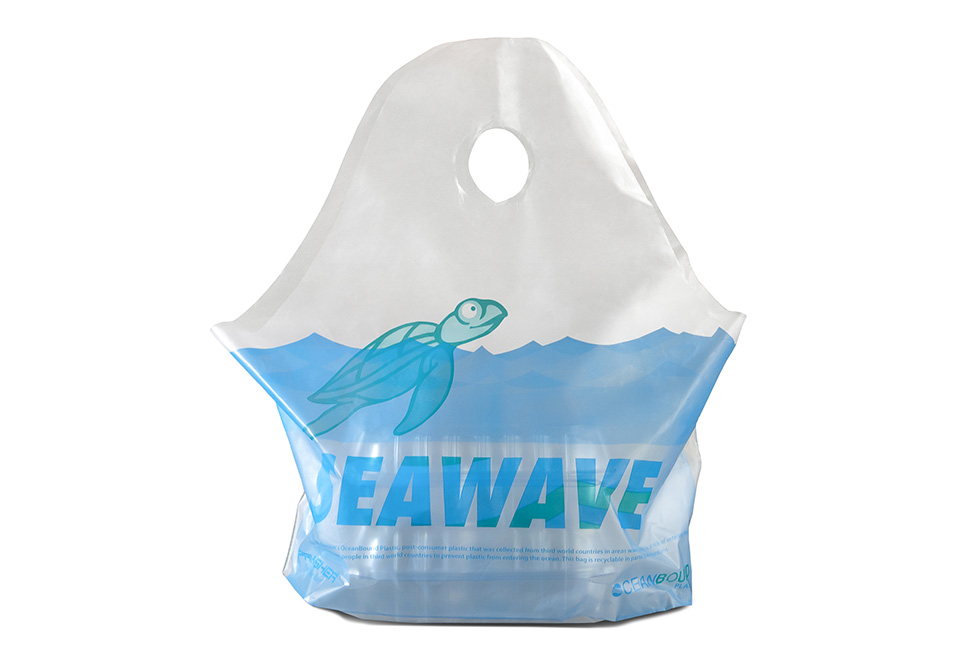
Acquired firm Pak-Sher, which produces the SeaWave bag made with plastic at risk of entering the sea, will be incorporated into Revolution’s Command Packaging brand. | Courtesy of Revolution Plastics.
Plastics recycling company Revolution has acquired a producer of bags, foodservice film and other products. Revolution anticipates incorporating more recycled resin into the manufacturer’s offerings.
Revolution this month acquired Pak-Sher, a manufacturer based in Kilgore, Texas. Pak-Sher will be incorporated into Revolution’s Command Packaging brand, which manufactures products for the retail, foodservice and grocery markets.
Pak-Sher is a privately owned family business. Similar to Command Packaging, Pak-Sher produces carry-out bags. But Pak-Sher also produces back-of-house products used in restaurants and other places, including pan liners, bags for kitchen prep and more. That will be a new product sector in the Revolution business.
Based in Little Rock, Ark., Revolution operates plastics recycling company Revolution Plastics, manufacturer Delta Plastics and other companies. The company recycles ag plastics into a variety of applications, including new ag products, grocery bags and more.
Revolution has been expanding significantly on the ag plastics collection side of the business in recent years, but the latest acquisition bolster the company’s end-use arm. Command Packaging manufactures products in a facility in Vernon, Calif. Adding Pak-Sher’s Texas presence gives Command logistical advantages to supply customers further east, said Cherish Miller, vice president of marketing and sustainability for Revolution.
“We had been looking as a company through our Command brand to expand beyond just California,” Miller said.
Pak-Sher hasn’t used a great deal of post-consumer resin (PCR) in the past, and the material the company has used has come from external suppliers. With the Revolution acquisition, supply will be brought in-house with Revolution’s reclamation capacity, Miller said. Revolution plans to expand the use of PCR within Pak-Sher’s production.
“That’s our whole goal: to use as much as we can,” Miller said.
Under the Command supply model, a separate Revolution entity called Encore Recycling collects 100 million pounds of ag plastic per year. That plastic goes to an Encore facility in Salinas, Calif., where it is processed into PCR. The resulting pellets are shipped to Command Packaging in Vernon, where they are used to produce the company’s Smarterbags, thick, reusable bags that contain up to 20% PCR.
Under California law, reusable grocery bags such as these must include at least 20% PCR, a percentage that will go to 40% in January.
Although Pak-Sher has used only small amounts of PCR overall, one notable endeavor the company recently began is a partnership with Envision Plastics’ OceanBound resin program. Through the OceanBound initiative, post-consumer plastic that is at risk of entering waterways in developing countries is collected and processed.
Pak-Sher this month introduced its SeaWave bag, which is made from 50% OceanBound plastic.
In addition to the Pak-Sher acquisition, Revolution itself drew outside capital over the summer: A New York City private equity firm took a controlling interest in Revolution. The equity firm cited Revolution’s plans for growth and anticipated increases in PCR demand as attractive points about the company’s business model.
More stories about brand owners
- Packaging giant invests to expand PCR capability
- Candy giant Mars reached 7% PCR use in 2024
- Coke bottler’s switch to clear PET provides lessons learned